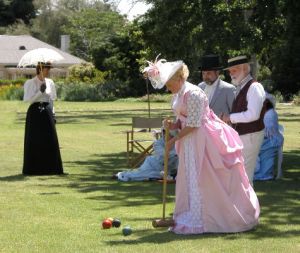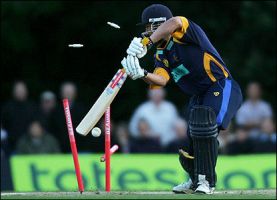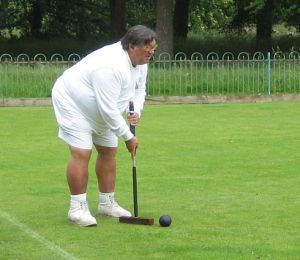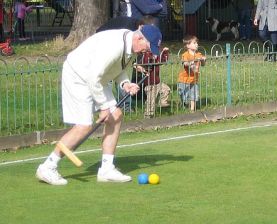 A casual game?
A casual game?Are you a cricketer now finding it increasingly hard to chase balls to the boundary? The good news is that croquet
balls stand still while you are trying to hit them!
 A bit too fast for you?
A bit too fast for you?
The bad news (for ALL cricketers) is that you have to be ACCURATE! Proper hoops are tight, barely wider than the
ball, you need to be good at hitting distant balls, and you need to be a good judge of length as well as line too.
The club has several former cricketers amongst its members. They have taken to croquet quickly as it
involves some of the same skills and has the same summer season as cricket, and it allows them to get out in the fresh air and continue to enjoy a competitive sport without being too strenuous.
The popular image of croquet is a casual game played by tapping at balls during polite conversation,
interrupted from time to time by tea and cucumber sandwiches. Well, that does exist at one end of the spectrum.
But did you know that at the other end it is a serious, competitive sport with international
Test Matches against Australia, New Zealand
and the USA in the top division of the world team championships? (England came second to hosts NZ in the in winter
2013-14, having won it on the previous 7 occasions!)
There are many competitions available for both individuals and teams: club and national tournaments, inter-club
leagues,
regional and national
inter-county
tournaments, open championships and
world championships.
And both
national and
world rankings for the top players. Click on the links
to see some examples.
 Formerly a cricket all-rounder and county
Formerly a cricket all-rounder and county
chess champion. Still keen on sport, these
days he is a county-level croquet player.Some people remark knowingly that croquet is a vicious game, all about hitting your opponent's balls off the court.
WRONG! - for the traditional game of Association Croquet, anyway. If played properly, quite the opposite is true.
The
art is to construct breaks, quite like in snooker, and in order to help with that you want to keep your opponent's
balls in the middle of the court. Furthermore if you send one of your opponent's balls off the court, in most cases it
will end your turn, the last thing you want to happen. (No runs scored for boundaries!)
 A club member and former batsman,
A club member and former batsman,
still keeping a straight bat
and his eye on the ball
It comes as a surprise to many when they realise the depth of tactical complexity in croquet. As in
chess, in a good croquet break you should plan several shots (moves) ahead so that the balls (pieces) are in the right place at the right
time. But unlike chess, and more like cricket or snooker, you can't guarantee that a single shot will go exactly where
you want it to go.
So every choice of shot requires a judgement about
the balance of risks: what is the potential upside if you succeed vs. how much would you lose if you fail? Tricky!
The combination of physical
ball skills, judgement of risks and tactics is what makes croquet such an intriguing game, and why it often
appeals to cricketers used to the need for both skill and thought. W.G. Grace used to play croquet too!
But not everyone is an expert. Croquet can also be enjoyed by novices, and as in cricket there is huge scope for
improvement. There is a very effective handicapping system, quite like golf, which really does level the game across all standards of
play, such that even a high handicapper stands a decent chance in handicap play against a top player. This is not just
hypothetically either! The 5-times world champion sometimes plays in
handicap tournaments not far from here against
anyone who turns up.
So why not give croquet a try? Just turn up at a regular
Watford club session -
you can play for
free in up to three of them before being asked to join the club.

 EACF AC Club Champions Tournament
EACF AC Club Champions Tournament
 Open AC Midweek Advanced
Open AC Midweek Advanced
 Open AC Midweek B-Level Advanced
Open AC Midweek B-Level Advanced
 Open AC One-Day
Open AC One-Day
 AC Level Advanced
AC Level Advanced
 AC B-Level Advanced
AC B-Level Advanced
 AC Handicap
AC Handicap
 AC All England Handicap
AC All England Handicap
 AC High Handicap
AC High Handicap
 AC Charity One-Ball
AC Charity One-Ball
 AC One-Ball (Sep)
AC One-Ball (Sep)
 AC One-Day (Sep)
AC One-Day (Sep)
 AC One-Day Doubles (Aug)
AC One-Day Doubles (Aug)
 Open SC
Open SC
 SC One-Day (Jul)
SC One-Day (Jul)
 GC All England Handicap Championship Final
GC All England Handicap Championship Final
 Open GC
Open GC
 Open GC A-level
Open GC A-level
 Open GC B-Level
Open GC B-Level
 Open GC C-Level
Open GC C-Level
 Open GC D-Level
Open GC D-Level
 Open GC Handicap Doubles
Open GC Handicap Doubles
 GC Level Play
GC Level Play
 GC All England Handicap
GC All England Handicap
 GC Handicap Singles
GC Handicap Singles
 GC Intermediate (B-level)
GC Intermediate (B-level)
 GC High Handicap
GC High Handicap
 GC Handicap Doubles
GC Handicap Doubles
 GC Progressive Doubles (Apr)
GC Progressive Doubles (Apr)
 GC Progressive Doubles (Sep)
GC Progressive Doubles (Sep)
 GC One-Day Singles (Jun)
GC One-Day Singles (Jun)



